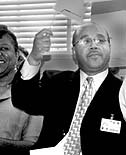Wednesday, October 4, 2006
Jackson Public School Superintendent Earl Watkins and JPS School Board President H. Ann Jones held an editorial board meeting with the Jackson Free Press last week, arguing for a $150 million bond proposal, which will be put to a vote by Jackson voters this November. Both Jones and Watkins believe it's necessary in a district facing overcrowding. Over the last two decades, the district has built low-quality aluminum portables to house a surge of students, constituting about 300 potential tornado-hazards throughout Jackson.
Some teachers hold classrooms in hallways, and some schools' gyms are too dangerous from falling or rotting debris for students to enter. Jackson School Board members approved the bond last month to add-on to seven schools, build two new ones and replace five.
Expenditures include a $4 million renovation for Barr Elementary; a $7 million renovation for Forest Hill; $5 million building additions to Casey, North Jackson and McLeod Elementary Schools; and a $7 million addition to Wilkins Elementary School. Larger projects include $18 million total school replacements for Blackburn and Peeples Middle Schools. The bond will also pay for a new north Jackson school and a new South Jackson school—an $18 million endeavor. A second South Jackson school is expected to cost around $10 million.
JFP: You'll need teachers to staff the new classrooms. Has the district budgeted for that?
Watkins: That addition may not be a vast amount, but we'll have to pay for it, of course.
Jones: The improved schools can be used as a recruiting tool. Once we've got new classrooms better fit for technology and new construction, we'll be able to attract more teachers from other places.
Watkins: Keep in mind as well that once we get (the Mississippi Adequate Education Program) fully funded, we'll have funds to hire more teachers. Right now the district is funding it, but with MAEP, the state will help.
JFP: Yes, but the state rarely provides full MAEP funding.
Watkins: Always remain positive.
Jones: Keep in mind it's an election year, and there's always a push to fully fund MAEP during an election year.
JFP: Critics maintain that suburbs like Madison don't have taxes, like the school bond issue, to stifle development. What's your response?
Watkins and Jones (in unison): But they do.
Jones: Madison just passed a bond. I think all the districts in the metro area are experiencing growth, not just Jackson. So to fulfill its particular needs, each school district must do what is necessary to provide the best facilities.
JFP: Critics say businesses like the Metrocenter Mall, which already suffer some fiscal strain, could find themselves with an extra $100,000 in annual taxes from the bond. What's your argument?
Jones: Building new schools will attract new taxpayers to the city. There will be new construction jobs in the city … and some of those paychecks will be spent out at the Metrocenter Mall.
JFP: Can we assume that the turnover will be fast enough to counter the new bill that the Metrocenter will have to pay?
Jones: I think so. This new increase won't show up until 2008, and certainly we'll have begun construction before then. Some of it might even be finished by then. We'll see some of those jobs coming online next year, by summer and fall of next year. These dollars will begin to turn over by the time taxes come due.
JFP: There are nightmare rumors out there about the interest payments on the bond. I've heard one scenario comparing it to buying a $150 lawn mower and paying 35 cents a month for it, which with a high interest rate, could really hurt us. What's your response?
Jones: Whatever scenario you've got is nothing compared to considering what delaying it might do. Simply put: we need the lawn mower. It's like, pay me now or pay me more later.
Watkins: You can look at the district's track record in recent years. We've always paid back our loans ahead of time.
JFP: Where will Jacksonians really feel the mill increase?
Jones: Homes and cars. The average home is Jackson runs $64,000. For the average home that will be about $49 a year.
Watkins: For a $40,000 auto, the addition will be about $89.04, approximately. For a $20,000 car, it'll be about $44.52.
Jones: But also, that's way above the average car. The average car in Jackson will cost about $15,000. And whatever is quoted on the average $64,000 home does not even include the homestead exemption.
Watkins: (Many cars) leaving a lot in Jackson are actually between $7,000 and $12,000, so we're looking at about $20. Secondly, because of the stewardship of the district, (we) were able to pay off the last bond early and roll this new bond into it, so a large part of that you will not see any tax increase at all. It'll be what the citizens are already paying.
Jones: (Also) a part of this $150 million is already on the book from the last referendum.
Watkins: About $35 million.
Jones: Because we were able to pay it off early, it's scheduled to roll off the books next year. Since that's already off the book, we're actually asking for about a $100 million increase.

Comments
Use the comment form below to begin a discussion about this content.
Sign in to comment
Or login with:
OpenID